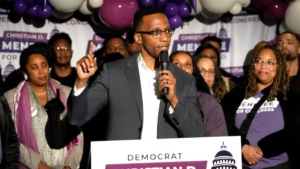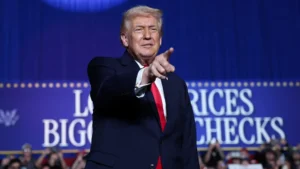Trump’s Madman Strategy: Is It Quietly Reshaping America’s Domestic Power Game? That question is no longer just theoretical—it’s now central to understanding how power, loyalty, and public service are being redefined in America today. Once thought to be used only to confuse foreign adversaries, this unpredictable and aggressive strategy is now aimed at America’s own institutions, reshaping government from the inside out.
What Is Trump’s Madman Strategy and Where Did It Start?
The Madman Theory originated with President Richard Nixon during the Cold War. The idea was to convince enemies that the U.S. President might act irrationally, making them cautious. Donald Trump revived this tactic on the world stage, using unpredictability as a weapon—walking away from deals, launching surprise tariffs, or abruptly ending summits.
But since 2023, Trump and his allies have begun applying the same logic to domestic politics, targeting the federal workforce, civil protections, and long-held democratic norms.
How Trump’s Strategy Is Now Targeting U.S. Institutions
This modern version of the strategy goes beyond shocking tweets or policy flip-flops. One of the most significant actions was the proposed return of Schedule F, a classification that would allow mass firing of tens of thousands of federal workers. It would remove civil service protections, giving Trump (or any president) the ability to install loyalists in government roles traditionally protected from political influence.
Traditional U.S. Governance vs. Madman Strategy
| Aspect | Traditional Governance | Trump’s Madman Strategy Impact |
|---|---|---|
| Civil Service Protections | Nonpartisan, job-protected workforce | Plan to fire thousands via Schedule F |
| Policy Decision Style | Data-driven, gradual reforms | Instinctual, sudden reversals |
| Foreign Policy Approach | Diplomatic consistency | Abrupt exits and reentries (e.g., tariffs) |
| Internal Stability | Predictable chain of command | High turnover, loyalty over skill |
| Strategic Communication | Clear government messaging | Disruption and deliberate confusion |
Why Trade and Domestic Policies Are Becoming Unpredictable
Recent events show how Trump’s strategy affects not just government employees but economic partners as well. On April 10, he unexpectedly paused his proposed 100% reciprocal tariffs for 90 days—confusing markets and global leaders alike.
According to many officials believe the pause came as a reaction to Wall Street backlash, not as part of a coordinated plan. This confirms that his decisions are often tactical responses, not long-term strategies.
This unpredictability, once confined to foreign policy, now defines his domestic approach as well—leaving federal agencies in limbo and citizens uncertain about what policies might be enforced tomorrow.
What Experts Are Warning About This Strategy
Many political analysts and former government officials warn that treating internal institutions as adversaries—rather than partners—has long-term consequences. Removing independent oversight, eroding civil service protections, and concentrating power in loyalist hands risks undermining democracy itself.
Some experts believe the strategy is working not because it’s coherent, but because it’s overwhelming. It keeps opponents reacting, fragments media coverage, and rewards loyalty over qualification.
Why It Matters for America’s Future
The rise of this strategy has redefined how U.S. politics operates. The federal workforce is demoralized, norms are eroding, and political power is becoming increasingly personal.
According to the Brookings Institution, over 50,000 civil servants could be affected by Schedule F if reinstated, representing one of the largest shifts in the structure of the U.S. government since the 1970s.
This is not just about Donald Trump—it’s about whether future administrations will adopt the same tactics, forever altering the balance of power between the White House and the rest of the U.S. government.
Conclusion: Is America Entering a New Era of Governance?
Trump’s Madman Strategy is no longer just a foreign policy tactic—it’s becoming a framework for domestic governance. Whether viewed as disruptive genius or dangerous overreach, the evidence shows this approach is actively reshaping how power works in America.
With public institutions under pressure, political messaging more chaotic, and loyalty rewarded over experience, we may be witnessing the beginning of a long-term transformation of U.S. politics.
[USnewsSphere.com / axi.]





